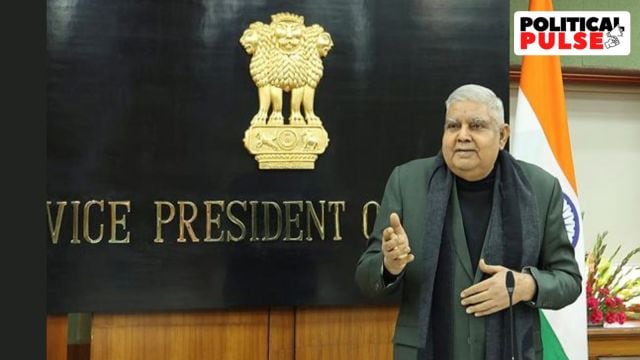As V-P Jagdeep Dhankhar says ‘no authority above Parliament’, a look at his previous run-ins with the judiciary
The very day he assumed charge as Chairman of the Rajya Sabha, in December 2022, Jagdeep Dhankhar had hit out at the apex court over its decision to scrap the NJAC.
 While his two recent statements have come in quick succession, it is not the first time that V-P Jagdeep Dhankhar has been at odds with the judiciary. (Express Archive Photo by Renuka Puri)
While his two recent statements have come in quick succession, it is not the first time that V-P Jagdeep Dhankhar has been at odds with the judiciary. (Express Archive Photo by Renuka Puri)Repeating his recent criticism of a Supreme Court order setting timelines for the President and Governors to give assent to pending Bills, Vice-President Jagdeep Dhankhar on Tuesday said “no authority was above Parliament”.
“Every word spoken by a Constitutional functionary is guided by supreme national interest. In one case, the Supreme Court says the Preamble is not part of the Constitution… In another, it says it is… But let there be no doubt about the Constitution. Elected representatives will be ultimate masters of what the Constitution will be. There cannot be any authority above them…,” he said.
While his two recent statements have come in quick succession, it is not the first time that Dhankhar has been at odds with the judiciary:
December 2022: On the same day that he assumed charge as the Chairman of the Rajya Sabha, Dhankhar slammed the Supreme Court for striking down the National Judicial Appointments Commission (NJAC).
In his first-ever address to the Upper House as Chairman, Dhankhar termed the apex court’s move as a “glaring instance” of “severe compromise” of parliamentary sovereignty and disregard of “the mandate of the people”.
Pointing out that “democracy blossoms and flourishes when its three facets, the Legislature, the Judiciary and the Executive, scrupulously adhere to their respective domains”, Dhankhar said: “The sublimity of Doctrine of Separation of Powers is realised when the Legislature, Judiciary and Executive optimally function in tandem and togetherness, meticulously ensuring scrupulous adherence to respective jurisdictional domains. Any incursion by one, however subtle, in the domain of the other, has the potential to upset the governance apple cart. We are indeed faced with this grim reality of frequent incursions.”
January 2023: Delivering the inaugural address at the 83rd All-India Presiding Officers’ Conference in Jaipur Wednesday, Dhankhar questioned the Supreme Court’s landmark 1973 judgment in the Kesavananda Bharati case, which laid down that Parliament cannot change the basic structure of the Constitution.
“In a democratic society, the basic of any basic structure is supremacy of the people, sovereignty of the people, sovereignty of Parliament. Executive thrives on the sovereignty of Parliament. Legislatures and Parliament decide who will be the Chief Minister, who will be the Prime Minister. The ultimate power is with the Legislature. The Legislature decides who will be in other institutions. In such a situation, all Constitutional institutions – the Legislative, Executive, Judiciary – are required to be within their limits,” he said.
“In 1973, in the Kesavananda Bharati case, the Supreme Court gave the idea of basic structure saying that Parliament can amend the Constitution, but not its basic structure. With due respect to the Judiciary, I cannot subscribe to this,” Dhankhar said.
At the same event, then Union Law Minister Kiren Rijiju had termed the collegium system of appointing judges as “opaque”.
The Bombay Lawyers’ Association moved the Bombay High Court against the two leaders over their statements, but the court dismissed the plea in February 2023. The association subsequently moved the Supreme Court, but the apex court refused to entertain its plea.
April 18, 2025: Close on the heels of the Supreme Court verdict in the Tamil Nadu government’s plea against Governor R N Ravi, in which it set a timeline for the President and governors to give assent to Bills, Dhankhar said India was never meant to have a democracy where judges function as lawmakers, the Executive, and even as a “super Parliament”.
He also referred to Article 142 as “a nuclear missile against democratic forces, which was available to the judiciary 24×7”.
Speaking to a batch of Rajya Sabha interns, Dhankhar said the judiciary is Constitutionally empowered to interpret laws but not to direct the functioning of the Executive. “We cannot have a situation where you direct the President of India. Where are we heading? What is happening in the country?” he said.
April 22, 2025: Asserting that Parliament is supreme, Dhankhar said, “There is no visualisation in the Constitution of any authority above Parliament. Parliament is supreme… Let me tell you, it is as supreme as every individual in the country.”
Addressing a Delhi University event, he said: “I find it conceivably intriguing that some have recently reflected that constitutional offices can be ceremonial or ornamental. Nothing can be further from an understanding of the role of everyone in this country — constitutional functionary or a citizen.”
Stating that every one of them has a role, he said, “Part of ‘We the People’ is an atom in democracy, and that atom has atomic power. That atomic power is reflected during elections and that is why we are a democratic nation.”



- 01
- 02
- 03
- 04
- 05




























